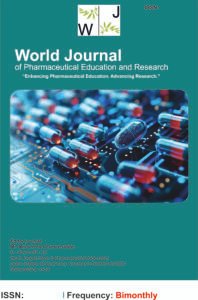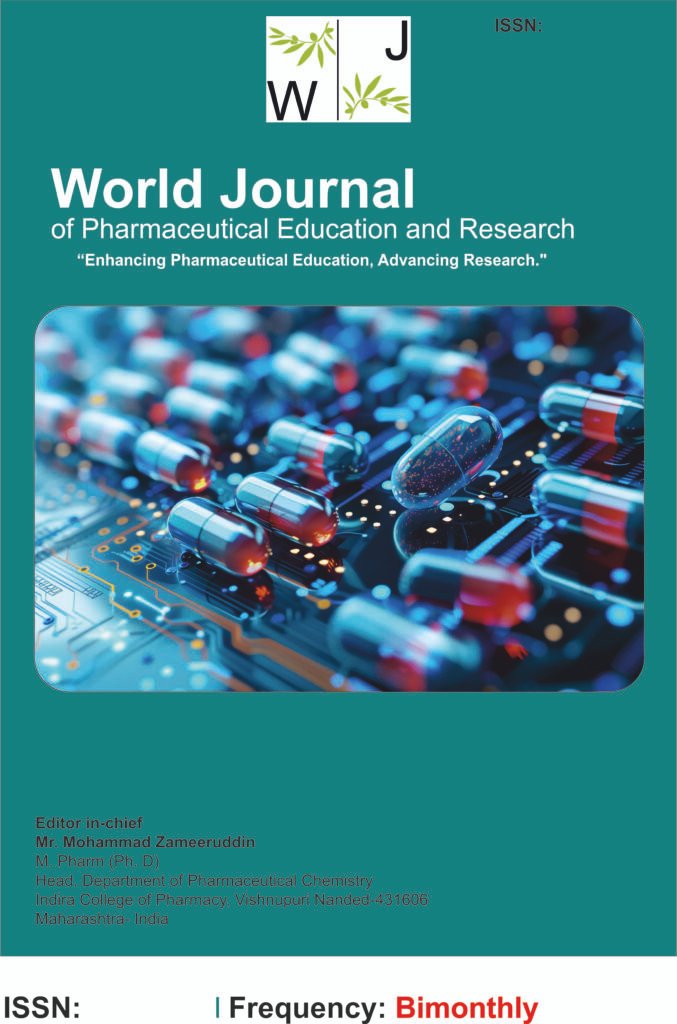Author Responsibilities
The World Journal of Pharmaceutical Education and Research is committed to maintaining the highest standards of ethics and integrity in scientific publishing. Authors submitting to our journal are expected to adhere to the following responsibilities and ethical guidelines:
- Originality and Plagiarism
- Original Work: Authors must ensure that their work is entirely original and has not been published or submitted elsewhere. Any work or words of others must be appropriately cited or quoted.
- Plagiarism Policy: Plagiarism in any form—whether it be direct copying, insufficient citation, or paraphrasing without credit—is strictly prohibited. Submissions are checked using plagiarism detection software, and manuscripts found to contain plagiarized content will be rejected immediately. Repeated offenses may result in banning the authors from future submissions.
- Self-Plagiarism: Reusing one’s previously published work without citation is also considered a breach of ethical standards.
- Authorship Criteria
- Author Contribution: Only those who have made a significant contribution to the conception, design, execution, or interpretation of the study should be listed as authors. All contributors who do not meet the criteria for authorship should be acknowledged in the manuscript.
- Corresponding Author: The corresponding author must ensure that all co-authors have seen and approved the final version of the paper and agreed to its submission to the journal.
- Changes to Authorship: Any changes in authorship (addition or removal of authors, or changes in the order of authors) must be agreed upon by all co-authors and communicated to the journal before the article is accepted.
- Ethical Considerations
- Human and Animal Rights: For studies involving human subjects or animals, authors must ensure compliance with relevant ethical standards. A statement of approval from the appropriate institutional ethics committee must be provided, and authors should indicate whether informed consent was obtained from human participants.
- Declaration of Ethical Approval: Authors must provide evidence of ethical approval or a statement of exemption for any study involving humans or animals.
- Conflicts of Interest: Authors must disclose any potential conflicts of interest that could influence the research, such as financial, personal, or professional relationships with organizations or individuals.
- Accurate Reporting and Data Integrity
- Honesty in Reporting: Authors are expected to provide an accurate account of the research performed and an objective discussion of its significance. Fraudulent or knowingly inaccurate statements are considered unethical behavior and will not be tolerated.
- Data Access and Retention: Authors may be asked to provide the raw data for editorial review and should be prepared to make the data available publicly, if appropriate. Authors should retain all data for a reasonable period after publication.
- Fabrication and Falsification of Data: Fabricating or manipulating research data or results is a serious violation of ethical standards and will result in the rejection of the manuscript and other appropriate actions.
- Disclosure of Funding Sources
- Funding Acknowledgment: Authors must fully disclose any sources of funding for the research, including the roles of sponsors in the research process (if applicable). This includes financial support from government agencies, pharmaceutical companies, or other organizations.
- Transparency: If a manuscript is submitted under a funded research project, the sponsor should have no influence over the content or findings of the research.
- Multiple, Redundant, or Concurrent Submissions
- Avoiding Duplicate Submissions: Authors must not submit the same manuscript to more than one journal simultaneously. Submitting the same research to multiple journals constitutes unethical publishing behavior and will lead to the rejection of the manuscript.
- Previously Published Work: Authors must declare if parts of the manuscript have been previously published or if the manuscript is under review elsewhere.
- Acknowledgment of Sources
- Proper Citation: Authors must properly cite the work of others that has been influential in shaping their research. Information obtained in private (through conversations, correspondence, or discussions with third parties) must not be used or reported without explicit permission from the source.
- Reusing Data or Content: If authors wish to reuse data or figures from previously published work, they must obtain permission from the copyright holders and clearly attribute the source.
- Error Correction and Retraction
- Author’s Responsibility to Correct Errors: If authors discover a significant error or inaccuracy in their published work, they must promptly notify the journal’s editor and cooperate to either retract or correct the paper.
- Retraction Policy: If ethical misconduct, such as plagiarism or data falsification, is found after publication, the journal reserves the right to retract the paper. Retractions will be clearly marked and explained on the journal’s website.
- Peer Review Process
- Participation in Peer Review: Authors are expected to participate actively in the peer review process. If revisions are requested, authors should respond promptly and in a constructive manner, addressing the reviewers’ feedback in a detailed and respectful way.
- Objectivity and Transparency: Authors must avoid personal attacks or inappropriate comments during the revision process and should focus on providing clear, evidence-based responses.
- Compliance with Journal Policies
- Adherence to Submission Guidelines: Authors must ensure that their submissions comply with the journal’s formatting, citation, and referencing guidelines. Submissions that do not adhere to these requirements may be returned to authors for revision before review.
- Open Access and Copyright: Authors must agree to the journal’s open access policy and ensure that their work is properly licensed under the applicable Creative Commons license.


